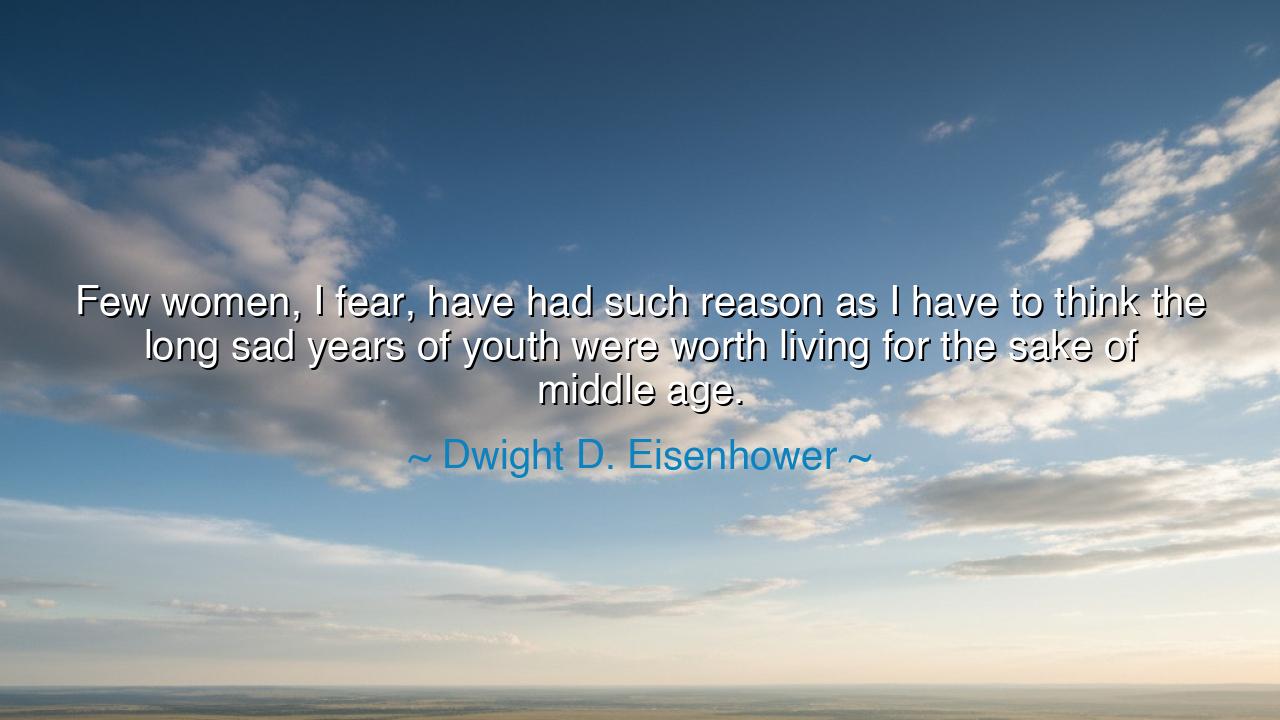
Few women, I fear, have had such reason as I have to think the
Few women, I fear, have had such reason as I have to think the long sad years of youth were worth living for the sake of middle age.






Hear the solemn words attributed to Dwight D. Eisenhower: “Few women, I fear, have had such reason as I have to think the long sad years of youth were worth living for the sake of middle age.” At first, these words seem cloaked in paradox, for how can years of sadness be judged worthwhile? Yet within them lies an ancient truth—that suffering endured in the early seasons of life often prepares the ground for strength, wisdom, and fulfillment in later years. The speaker reminds us that the harvest of middle age is sometimes purchased with the storms of youth.
The heart of this saying rests in the tension between youth and maturity. The years of youth are often painted as golden, filled with joy, vitality, and promise. But Eisenhower suggests another vision: that for some, those years are not golden, but sad—marked by struggle, uncertainty, and hardship. Yet these sorrows are not wasted. They serve as the crucible in which resilience is forged, and they make the eventual peace and purpose of maturity all the more precious. Thus, the long sadness of early life is redeemed by the richness of what follows.
The ancients knew this truth well. The philosopher Seneca spoke of hardship as the training ground of the soul, saying that no man can call himself strong if he has never been tested. Likewise, the poet Hesiod described the Ages of Man, in which the early toils of mortals prepared them for the tempered wisdom of later years. Across cultures, the same principle resounds: the sorrows of youth need not destroy us, but may become the foundation of a deeper, steadier strength in time.
History itself gives us many examples. Consider the life of Abraham Lincoln, whose youth was steeped in poverty, loss, and melancholy. His early years were heavy with labor and grief, yet it was precisely those “sad years” that gave him the patience, empathy, and endurance to guide his nation through its darkest trial. Without the sorrows of his youth, his greatness in middle age may never have blossomed. So too does Eisenhower’s reflection echo this truth—that hardship endured early may yield greatness later.
There is also in this saying a recognition of perspective. The pains of youth are often felt as endless; one believes they will never pass. But in hindsight, when viewed from the vantage of maturity, those years can be seen as stepping stones. What once felt unbearable may later be understood as necessary. Thus, Eisenhower’s words carry both lament and gratitude: lament for the sadness endured, gratitude for the strength and fulfillment it eventually made possible.
The lesson for us is clear: do not despise the sorrow of your early years, for it may prepare you for triumphs you cannot yet imagine. Endure the trials of youth with patience, for their meaning is not always revealed until much later. And when you reach the steadier ground of middle age, do not forget to look back with gratitude, recognizing that even the storms were part of the journey that brought you to calmer seas.
Practical wisdom calls to us: when you are young and sorrow weighs heavy, remind yourself that you are being tempered, like steel in fire. Do not yield to despair, but trust that the hardships you endure may one day become your greatest strength. And when you are older, do not look back only with bitterness; instead, honor your younger self, who carried the weight that allowed your present self to stand strong.
Thus, the words of Dwight D. Eisenhower resound as both warning and encouragement: “The long sad years of youth were worth living for the sake of middle age.” May we learn to see hardship not only as sorrow, but as preparation. May we walk through youth with endurance, through maturity with gratitude, and through all of life with the wisdom that even sadness may serve a higher purpose. For in the weaving of sorrow and strength lies the fullness of the human journey.






AAdministratorAdministrator
Welcome, honored guests. Please leave a comment, we will respond soon